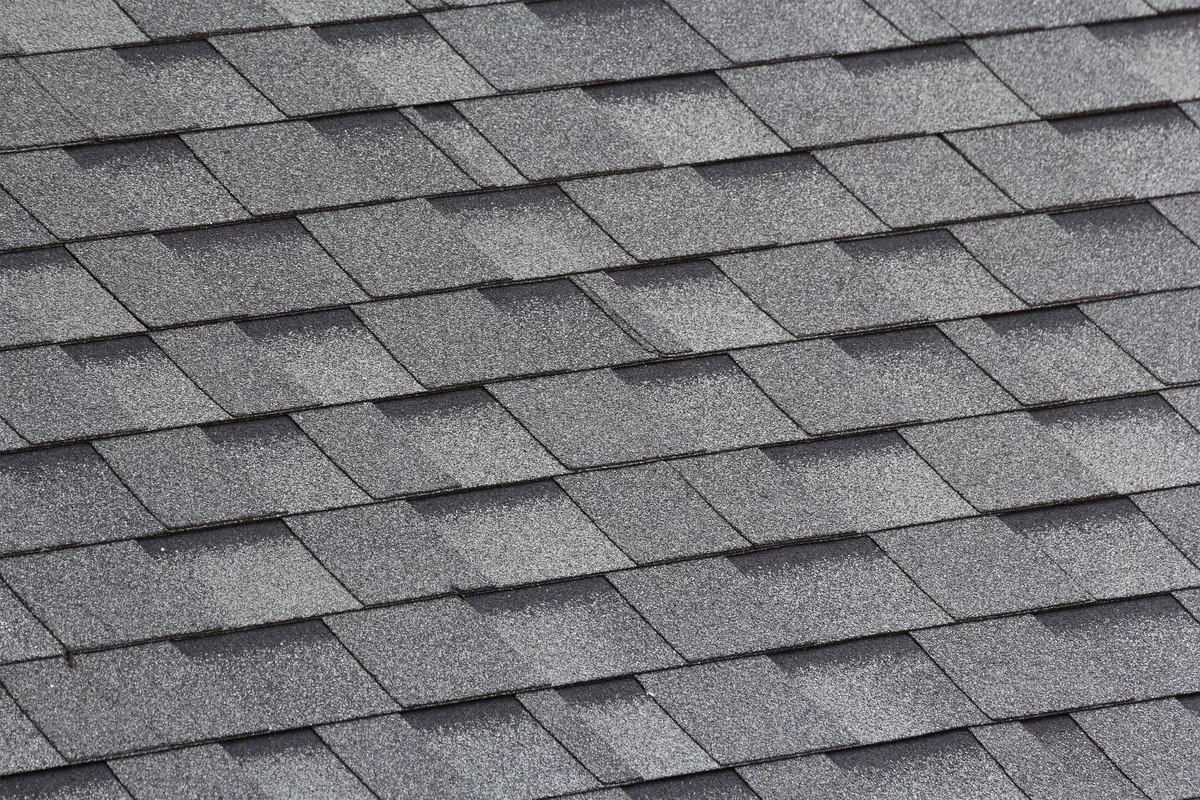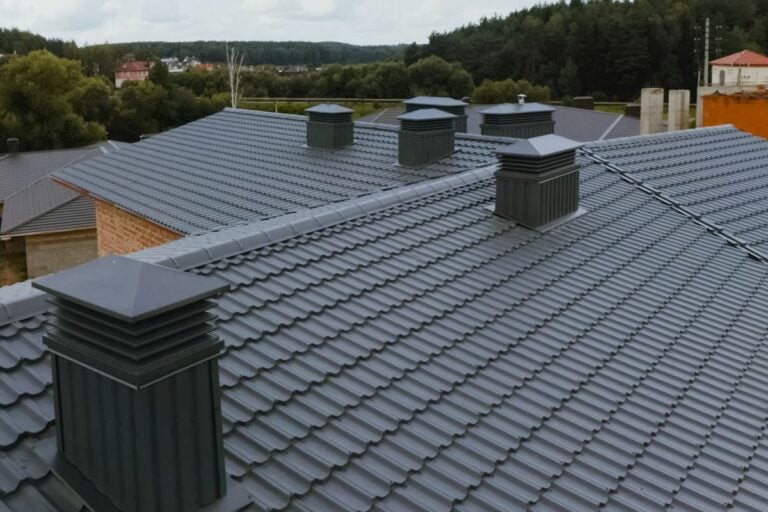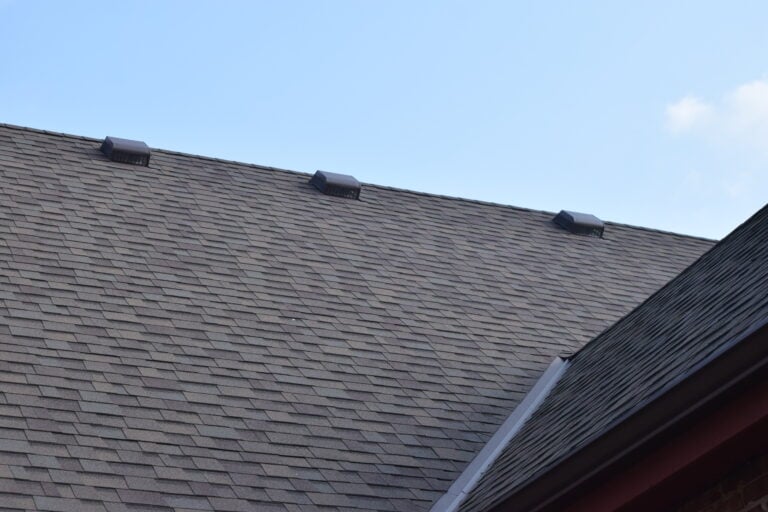When it comes to maintaining your home, the roof is one of the most critical elements. It shields your home from the elements, contributes to energy efficiency, and plays a significant role in the property’s overall aesthetic appeal. But just how long do roof shingles last?
This is a common question among homeowners, especially those looking to maximize their investment. In this blog post, we’ll explore:
- The lifespan of various types of roof shingles
- The different types of asphalt shingles
- When to replace your shingles
Understanding Roof Shingles

Before we dive into the specifics, it’s essential to understand what roof shingles are and why they are so important. Roof shingles are individual overlapping elements that cover the roof. They are typically flat, rectangular shapes laid in courses from the bottom edge of the roof up, with each successive course overlapping the joints below.
There are several types of shingles available, including asphalt, wood, metal, and slate, but for this guide, we’ll primarily focus on asphalt shingles due to their popularity and affordability.
Different Types of Asphalt Shingles
There are different types of asphalt shingle roof materials to choose from.
3-Tab Asphalt Shingles
These are the most basic and affordable type of asphalt shingles. They are called 3-tab shingles because each shingle is divided into three tabs or equal pieces. These shingles are flat and offer a uniform, slate-like appearance.
Architectural (Dimensional) Shingles
Architectural shingles are a premium type of asphalt shingle. They are thicker than 3-tab shingles and have a layered, dimensional look that can mimic the appearance of more expensive roofing materials like cedar or slate. They are also known for their durability and longer lifespan.
Luxury Shingles
Luxury shingles are the highest quality of asphalt shingles, designed to replicate the look of premium roofing materials such as natural slate and cedar shake roofs. They are heavier and thicker than architectural shingles and offer the highest level of durability and weather resistance.
6 Factors Affecting the Lifespan of Asphalt Shingles
The lifespan of asphalt shingles can vary widely based on several factors:
1. Quality of Shingles
Not all asphalt shingles are created equal. Higher-quality shingles, such as architectural or luxury shingles, generally have a longer lifespan compared to basic 3-tab shingles. Investing in higher-quality shingles can pay off in the long run with fewer repairs and replacements.
2. Installation Quality
Proper installation is crucial for the longevity of roof shingles. Poor installation can lead to various issues such as leaks, shingles blowing off, and premature aging. Always hire a reputable, experienced roofing contractor to ensure your shingles are installed correctly.
3. Climate and Weather Conditions
The climate in your area plays a significant role in the lifespan of your roof shingles. Extreme temperatures, heavy rainfall, snow, ice, and strong winds can all take a toll on your shingles. Homes in regions with harsh weather conditions may experience shorter shingle lifespans compared to homes in milder climates.
4. Roof Ventilation
Proper roof ventilation helps regulate temperature and moisture levels in the attic. Poor ventilation can lead to overheating and moisture buildup, which can cause shingles to deteriorate more quickly. Ensuring your roof has adequate ventilation can help extend the lifespan of your shingles.
5. Regular Maintenance
Regular maintenance, such as cleaning gutters, removing debris, and inspecting for damage, can help prolong the life of your shingles. Addressing minor issues promptly can prevent them from becoming major problems that shorten the lifespan of your roof.
6. Exposure to UV Rays
Prolonged exposure to ultraviolet (UV) rays from the sun can cause shingles to become brittle and lose their protective granules, leading to a shorter lifespan. UV-resistant shingles or additional roof coatings can help mitigate this effect.
Expected Lifespan of Asphalt Shingles
Based on the type of asphalt shingles and the factors mentioned above, here are the general lifespan expectations for each type:
3-Tab Asphalt Shingles

3-tab shingles typically have a lifespan of 15 to 20 years. While they are the most affordable option, they are also the least durable. Homeowners in areas with mild weather conditions may see their 3-tab shingles last closer to the 20-year mark, while those in harsher climates may need to replace them sooner.
Architectural Shingles
Architectural shingles generally last between 25 to 30 years, with some high-quality options potentially lasting up to 40 years. Their thicker, more durable construction makes them more resistant to weather-related damage and general wear and tear.
Luxury Shingles
Luxury shingles have the longest lifespan of any asphalt shingles, often lasting 30 to 50 years. Their premium construction and materials provide superior durability, weather resistance, and aesthetic appeal.
Signs Your Asphalt Shingles Need Replacement
No matter the type of shingles you have, it’s essential to know the signs that indicate they need replacement. Here are some common indicators:
- Curling or Buckling Shingles: Shingles that are curling or buckling are often a sign of weather damage or poor installation. This can compromise the roof’s ability to shed water effectively and may require immediate attention.
- Missing Shingles: If you notice shingles missing from your roof, it’s a clear sign that your roof may be nearing the end of its lifespan. Missing shingles can expose the underlying roof structure to the elements, leading to leaks and further damage.
- Granule Loss: Asphalt shingles are coated with granules that protect them from UV rays and add durability. If you find granules accumulating in your gutters or notice bald spots on your shingles, it’s a sign that they are deteriorating and may need replacement.
- Damaged Flashing: Flashing is the material used to seal joints and prevent water from penetrating the roof. Damaged or corroded flashing can lead to leaks and other issues that may necessitate shingle replacement.
- Roof Leaks: Water stains on your ceiling or walls can indicate a roof leak. While leaks can sometimes be repaired, recurring issues often signal that it’s time for a new roof.
- Age of Roof: If your roof is approaching the end of its expected lifespan based on the type of shingles used, it’s wise to start planning for a replacement, even if there are no obvious signs of damage. Proactive replacement can prevent more significant issues down the line.
Tips for Extending the Lifespan of Your Asphalt Shingles
While asphalt shingles have a finite lifespan, there are steps you can take to maximize their longevity:
Regular Inspections
Schedule regular inspections, preferably twice a year (spring and fall), to identify and address any potential issues early. Professional inspections can catch problems that may not be visible from the ground.
Clean Your Roof
Remove leaves, branches, and other debris from your roof and gutters to prevent moisture buildup and potential damage. Keeping your roof clean can help maintain the integrity of the shingles.
Trim Overhanging Branches
Trim any tree branches that hang over your roof to prevent them from rubbing against the shingles and causing damage. Falling branches during storms can also cause significant harm to your roof.
Ensure Proper Ventilation
Make sure your attic and roof have adequate ventilation to prevent heat and moisture buildup. This can help prevent shingle deterioration and extend their lifespan.
Address Repairs Promptly
If you notice any damage or issues with your roof, address them promptly. Delaying repairs can lead to more extensive damage and reduce the overall lifespan of your shingles.
Consider Roof Coatings
Applying a reflective roof coating can help protect your shingles from UV damage and reduce heat absorption. This can be particularly beneficial in regions with intense sunlight.
Time For an Asphalt Roof Replacement

Understanding the lifespan of your roof shingles and taking proactive steps to maintain them can significantly extend their longevity and protect your investment. Whether you have 3-tab, architectural, or luxury shingles, regular maintenance, proper installation, and addressing issues promptly are key to maximizing their lifespan.
If you’re unsure about the condition of your roof or need professional advice, don’t hesitate to contact a reputable roofing contractor for an inspection. Investing in high-quality shingles and taking care of your roof can provide peace of mind and ensure your home remains safe and comfortable for years to come.
For more information on roofing materials and maintenance tips, or to schedule a professional roof inspection, contact our team at Palladium Roofing.





